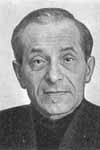The page of Zoscsenko, Mihail, English biography
Biography
August 9 marked the 110th birth anniversary of the well-known Russian writer and satirist Mikhail Zoschenko. A talented author who struck out a line of his own, Zoschenko was tremendously popular in the 1920s but faced heavy criticism and persecution in the late 30s and especially in the 40s. In the 20s his books, printed in huge numbers, were literally swept off book counters. Literary journals struggled for the right to publish his new works. The entire nation read and quoted Zoschenko. His books were translated into many languages. He was even conferred the Order of the Red Banner of Labor. Yet, the same Stalinist regime humiliated and crushed him, when his humor and satire began irritating the authorities who scolded him for the absence of positive characters and plots about the building of a happy Soviet life, and accused him of failing to meet the standards of "socialist realism". A special Communist party resolution called Zoschenko a "breeding ground" of vulgarity. But history has put everything in its proper place, as it always does, and today Zoschenko's humorous short stories are again widely popular. His feuilletons and comic novellas found their way to stage and are included into the list of compulsory literary works studied at schools. The main heroes of his books are primitive, unintelligent, ill-bred people with low-pitched desires, who speak "pigeon" Russian full of grammar mistakes and vulgarisms, and get into all sorts absurd situations. These silly Babbits, whose tragic incoordination falls out of tune with the times, are the target of his satirical arrows. Yet, he ridicules them with a touch of sadness and lyricism, making readers both laugh at and sympathize with them. Zoschenko's characters are the same "insignificant, life-beaten, miserable creatures" we often come across in works by Chekhov, Dostoyevsky and Gogol, only they exist in a new time whose spirit is totally beyond their comprehension. The famous 19th-century Russian poet and writer Alexander Pushkin was Zoschenko's literary god whom he worshipped to such an extent that he even attempted to imitate Pushkin's style in a story called "Talisman".




